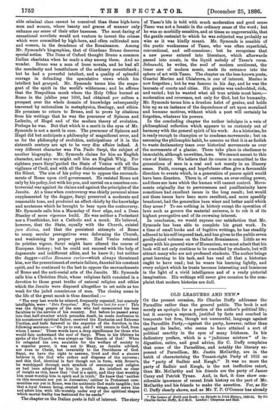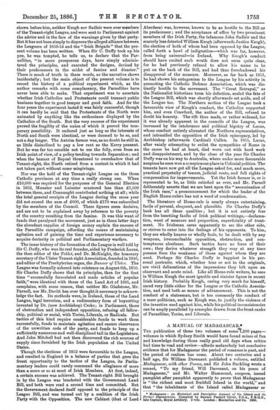OLD LEAGUERS AND NEW.* ON the present occasion, Sir Charles
Duffy addresses the. Parnellite rather than the general public. The book is not merely an apologia for a portion of the author's political life ; but it conveys a reproach, justified by facts and couched in temperate but firm, though not unscornful, language against. the Parnellite Party,—against the party, however, rather than against its leader, who seems to have attained a sort of political sanctity in the eyes of many Irishmen. In his dedicatory preface, which is a "judicious mixture" of in- dignation, satire, and good advice, Sir C. Duffy complains that some of the Parnellites, and notably the literary ex- ponent of Parnellism, Mr. Justin McCarthy, are in the habit of characterising the Tenant-right Party of 1852 as the "party of Sadleir and Keogh." It was no more the party of Sadleir and Keogh, is the not ineffective retort, than Mr. McCarthy and his friends are the party of James Carey and Patrick Tynan. And, in fact, it does show con- siderable ignorance of recent Irish history on the part of Mr. McCarthy and his friends to make the assertion. For, as Sir C. Duffy clearly shows, and as Mr. T. P. O'Connor has already
* The League of North and South : an Episode in Irish History, 1850-54. By Sir Charles Gavan Daffy, K.C.M.G. London : Chapman and Hall.
shown before him, neither Keogh nor Sadleir were ever members of the Tenant-right League, and were sent to Parliament against the advice and in the face of the warnings given by that party. But it has not been simply to disprove the alleged alliance between the Leaguers of 1850-54 and the "Irish Brigade" that the pre- sent volume has been written. When Sir C. Duffy took up his pen, he was tempted, he tells us, to declare that the Par- nellites, "in more prosperous days, have simply adminis- tered the principles, and executed the designs, devised by their predecessors in the midst of famine and disaster." There is much of truth in these words, as the narrative shows incidentally ; but the main object of the present volume is to record the history of a political experiment which, as the author remarks with some complacency, the Parnellites have never been able to make. That experiment was to ascertain whether Irish Catholics and Protestants could transact public business together in good temper and good faith. And for the four years the experiment lasted it was fairly successful, though it can hardly be said that the Protestants of the North were animated by anything like the enthusiasm displayed by the Catholics of the South. But the very success of the experiment proved the fragility of the union of which it proved the tem- porary possibility. It endured just as long as the interests of North and South were identical, or were deemed to be so, and not a day longer. The Antrim farmer was, as no doubt he still is, as little disinclined to pay a low rent as the Kerry peasant. But he was far too sensible not to see the folly, even from an Irish point of view, of a policy tending towards Separation ; and when the banner of Repeal threatened to overshadow that of Tenant-right, the North retired from a contest in which it had not taken part without some misgivings.
Nor was the hold of the Tenant-right League on the three Catholic provinces at any time a really strong one. When E10,000 was required for the purposes of the General Election in 1852, Munster and Leinster mustered less than £1,000 between them, and Connaught contributed nothing at all, while the total general receipts of the League during the same year did not exceed the sum of £800, of which £170 was subscribed by the members of the Council. These figures seem decisive, and are not to be explained away by reference to the poverty of the country resulting from the famine. It was this want of funds that paralysed the movement, just as in these latter days the abundant supplies of foreign money explain the success of the Parnellite campaign, affording the means of maintaining agitation and of gaining the time and experience necessary to acquire dexterity in political and Parliamentary warfare.
The inner history of the formation of the League is well told by Sir C. D uffy, who was its real founder, aided by Frederick Lucas, the then editor of the Tablet, and Dr. McKnight, the honorary secretary of the Ulster Tenant-right Association, founded in 1846, and editor of the Presbyterian organ, the Banner of Ulster. The League was formally ushered into existence on August 6th, 1850. Sir Charles Duffy shows that its principles, then for the first time "successfully formulated and made articles of popular faith," were identical with those of the Land Act of 1881, and complains, with some reason, that neither Mr. Gladstone, Mr. Parnell, nor Mr. Davitt has ever thought it necessary to acknow- ledge the fact. Its methods were, in Ireland, those of the Land League, legal terrorism, and a rudimentary form of boycotting invented by Dr. (now Archbishop) Croke ; in Parliament, those of obstruction and independent opposition, refusing all fellow- ship, political or social, with Tories, Liberals, or Radicals. But tactics of this kind require considerable funds to work them successfully, funds to maintain agitation and ensure observance of the unwritten code of the party, and funds to keep up a sufficiently numerous and well-disciplined tail in the Legislature. And John Mitchell had not then discovered the rich sources of supply since furnished by the Irish population of the United States.
Though the elections of 1852 were favourable to the League, and resulted in England in a balance of parties that gave the freest opportunity to the tactics of the League, its Parlia- mentary leaders could rarely command the allegiance of more than a score or so at most of Irish Members. At first, indeed, a certain success was achieved. The Tenant-right Bill brought in by the League was bracketed with the Government Land Bill, and both were read a second time and committed. But the Government declared itself opposed to the principle of the League Bill, and was turned out by a coalition of the Irish Party with the Opposition. The new Cabinet (that of Lord Aberdeen) was, however, known to be as hostile to the Bill as its predecessor ; and the acceptance of office by two prominent members of the Irish Party, the infamous John Sadleir and the scarcely less detested William Keogh (afterwards Justice Keogh), the election of both of whom had been opposed by the League, called forth a howl of indignation—which was far, however, from being universal—in Ireland. Why Keogh's conduct should have excited such wrath does not seem quite clear, for he had previously refused to allow his name to be put on the back of the Bill, and had thus foreshadowed his disapproval of the measure. Moreover, as far back as 1851, he had shown his antagonism to the League by his activity in promoting the Catholic Defence Association, which was dis- tinctly hostile to the movement. The " Great Betrayal," as the Nationalist historians term his defection, sealed the fate of the League Bill, which was shortly afterwards set aside, and of the League too. The Northern section of the League took a favourable view of Keogh's conduct, the Catholics supported him, and even Crawford, the author of the Bill, refused to doubt his honesty. The rift thus made, or rather widened, for it was already apparent in the councils of the League, was increased by the intolerance and political bigotry of Lucas, whose conduct entirely alienated the Northern representatives, and intensified the opposition of the Irish episcopacy, led by Archbishop (afterwards Cardinal) Cullen. In 1855, Lucas, after vainly attempting to enlist the sympathies of Rome in the cause he had at heart, died worn out with hard work and disappointment, and by the close of the year Sir Charles Duffy was on his way to Australia, where under more favourable auspices he soon won a ecnspicuous place in Colonial politics. The tenants have now got all the League asked for, and much more, practical perpetuity of tenure, judicial rents, and full rights of compensation for improvements. Yet the Irish farmer is, or is represented to be, as little satisfied as ever, and Mr. Parnell deliberately asserts that we are bent upon the "assassination of the Irish race," a pronouncement for which the leader of the English Home-rulers has not a word of condemnation.
The literature of Home-rule is nearly always entertaining, facile of perusal, eloquent, and plausible. Sir Charles Duffy's book has all these qualities ; but it is not entirely free from the besetting faults of Irish political writings,—declama- tion, want of measure and proportion, superficiality of treat- ment. No Irishman cares apparently to see the other side, or strives to enter into the feelings of his opponents. To him, they are wholly knaves or wholly fools, to be dealt with by any weapons, irreconcileable opposition, obstruction, and con- temptuous aloofness. Such tactics have no force of their own ; they derive whatever strength they may at any time possess from the weakness of those against whom they are used. Perhaps Sir Charles Duffy is happiest in his per- sonal portraits, which, whether true or not to the originals, are vivid delineations of the impressions they left upon an observant and acute mind. Like all Home-rule writers, he sees in William Keogh the most ignoble and sinister figure in recent Irish history. Probably Keogh, caring very much for himself, cared very little either for the League or the Catholic Associa- tion, and used both as means of advancement. This is not the conduct of a statesman, but is too commonly the conduct of a mere politician, such as Keogh was, to justify the violence of the invective used against him, while his political inconsistencies can be amply paralleled by examples drawn from the front ranks of Parnellites, Tories, and Liberals.



































 Previous page
Previous page